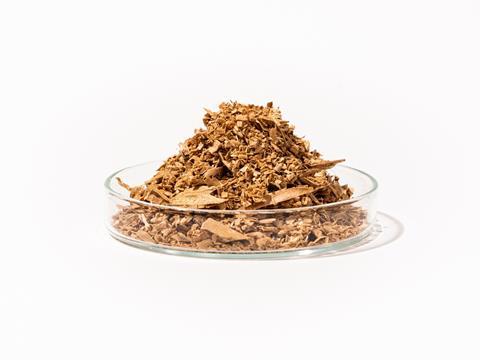
Montinutra plans to upscale its conversion of forest industry side streams into natural biochemicals for the chemical and cosmetics sectors with €2 million in pre-A funding led by Metsä Spring.
Intending to replace fossil-based consumption in the chemical and cosmetics industries, Montinutra utilizes chemical-free, pressurized hot water extraction – and recovery processes for energy and water – to create its natural products. They are all vegan, non-GMO, and biodegradable, the company explains, and can be used in industrial binders, barrier coatings, dispersants, and personal care products.
Examples of their application include an alternative to formaldehyde-based adhesives using the lignin and phenolic products under its Boreal Bioproducts brand, such as SpruceGlue. The line also offers solutions for film forming and natural colour, SPF-boosting, dispersant, and co-emulsifying uses in the cosmetics industry. For personal care, it can apparently provide active, anti-aging, and antioxidant ingredients for skincare.
“Forest industry side streams – such as sawdust, bark, or plywood processing residues – are currently hugely undervalued as raw materials, and are often burned for heat and energy,” explains Jaakko Pajunen, managing director of Montinutra. “Traditionally, the focus has also been on the utilization of cellulose from wood, but the possibility of utilizing the rest of the wood, namely hemicellulose and lignin, which make up over 50% of wood content, has been limited.
“We enable the broader utilization of hemicellulose and lignin extracts by developing biochemicals out of them. This is how we turn these previously underused side streams into mainstream materials and increase the value of the raw material in multiples.”
The Boreal Bioproducts range is thought to cut down on the CO2 footprint of similar fossil-based chemicals. Styrene-butadiene, acrylics used in binder applications, and other standard chemicals apparently have a CO2 footprint of up to 5,600kg of CO2 equivalent per ton (CO2e / ton) – a figure that Montinutra believes could greatly decrease when utilizing Boreal Bioproducts, with their reported footprint of below 150kg CO2e / ton, and introducing raw materials to bio-based binders.
“Solutions that use natural resources responsibly and reduce carbon emissions are much needed, not just for reaching global emission reduction targets, but also for helping different industries in their transformations from fossil-based to bio-based materials,” says Katariina Kemppainen, SVP, Group R&D at Metsä Group. “Montinutra helps their customers in this and aims to build a new industry in Finland that combines bio-economy, side streams, and added value.”
Montinutra states that the extraction technology is easily scalable, flexible, and applicable to other feedstocks, lignocellulosic or otherwise. It also emphasizes that forest industry sidestreams should remain a constant source of renewable feedstock, as they are available outside the growth season and are not competing with the same land as food cultivation.
Currently, the company is in the process of planning and pre-engineering its industrial demo plant for upcycling forest industry side streams. It is set to be built at the site of Metsä Group’s sawmill in Vilppula and commissioned in 2026.
Montinutra will use the funding from Metsä Spring and a syndicate of private investors to drive the plant’s design process and bring new contributions to Boreal Bioproducts to market, as well as accelerate its own internalization.
By 2035, the company aims to reach €100 million in annual revenue. It will also rebrand itself as Boreal Bioproducts in the near future.
Earlier this year, Metsä Spring provided Finnish start-up Fiberwood with funding to scale up production capabilities at its pilot plant. Fiberwood produces insulation and packaging materials from side streams of the mechanical wood industry.
Similarly, Metsä Group’s Kemi bioproduct mill and paperboard mill expansion recently began its operations – and pulp deliveries to customers have also commenced.
If you liked this article, you might also enjoy:
The L’Oréal approach to packaging sustainability
What steps is Apple taking to make its packaging more sustainable?
How did Brazil achieve its 100% aluminium can recycling rate – and can it be replicated in the EU?
Experts have their say on the EU’s Packaging and Packaging Waste Directive revisions
Also, if you’re interested in packaging sustainability, you will want to attend our Sustainable Packaging Summit in Amsterdam on 14-15 November. The Summit brings together leaders and pioneers from across the industry to align strategically, learn, network, and create a critical mass to accelerate change. You can learn more by clicking here, and you can buy a ticket to attend here.














No comments yet